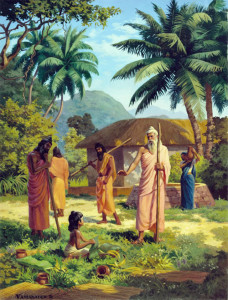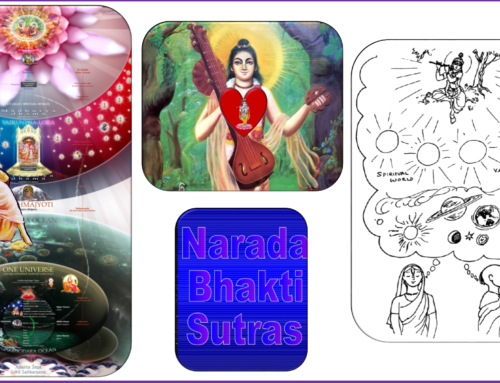Source: BG 9.2 purport
 In the Vedānta-sūtra (3.2.26) this is also described in the following words: prakāśaś ca karmaṇy abhyāsāt. “Devotional service is so potent that simply by engaging in the activities of devotional service one becomes enlightened without a doubt.”
In the Vedānta-sūtra (3.2.26) this is also described in the following words: prakāśaś ca karmaṇy abhyāsāt. “Devotional service is so potent that simply by engaging in the activities of devotional service one becomes enlightened without a doubt.”
A practical example of this can be seen in the previous life of Nārada, who in that life happened to be the son of a maidservant. He had no education, nor was he born into a high family. But when his mother was engaged in serving great devotees, Nārada also became engaged, and sometimes, in the absence of his mother, he would serve the great devotees himself. Nārada personally says,
ucchiṣṭa-lepān anumodito dvijaiḥ
sakṛt sma bhuñje tad-apāsta-kilbiṣaḥ
evaṁ pravṛttasya viśuddha-cetasas
tad-dharma evātma-ruciḥ prajāyate
In this verse from Śrīmad-Bhāgavatam (1.5.25) Nārada describes his previous life to his disciple Vyāsadeva. He says that while engaged as a boy servant for those purified devotees during the four months of their stay, he was intimately associating with them. Sometimes those sages left remnants of food on their dishes, and the boy, who would wash their dishes, wanted to taste the remnants. So he asked the great devotees for their permission, and when they gave it Nārada ate those remnants and consequently became freed from all sinful reactions. As he went on eating, he gradually became as pure-hearted as the sages. The great devotees relished the taste of unceasing devotional service to the Lord by hearing and chanting, and Nārada gradually developed the same taste. Nārada says further,
 tatrānv-ahaṁ kṛṣṇa-kathāḥ pragāyatām
tatrānv-ahaṁ kṛṣṇa-kathāḥ pragāyatām
anugraheṇāśṛṇavaṁ mano-harāḥ
tāḥ śraddhayā me ’nu-padaṁ viśṛṇvataḥ
priyaśravasy aṅga mamābhavad ruciḥ
By associating with the sages, Nārada got the taste for hearing and chanting the glories of the Lord, and he developed a great desire for devotional service. Therefore, as described in the Vedānta-sūtra, prakāśaś ca karmaṇy abhyāsāt: if one is engaged simply in the acts of devotional service, everything is revealed to him automatically, and he can understand. This is called pratyakṣa, directly perceived.




